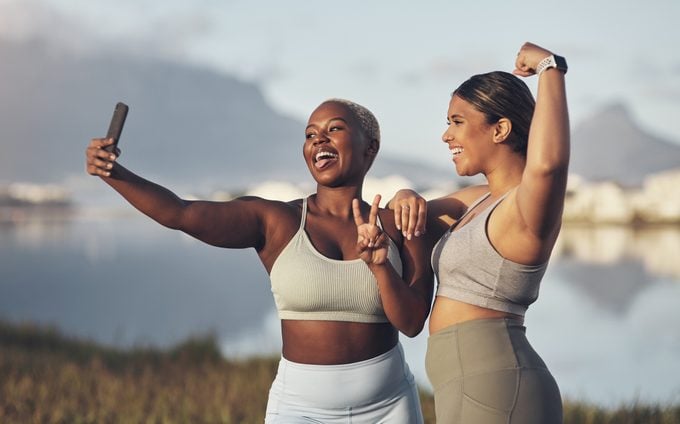Research Says This One Goal Will Motivate You to Exercise—and It’s Not Weight Loss
Updated: Apr. 16, 2024
Plus, a yoga teacher-dietitian lists six questions to help you focus less on the way your body looks, and more on what really matters.

We are here for the rise of conversation and social media posts that celebrate, honor, and call for acceptance and respect of all shapes and sizes. Aspiring to love your body, no matter what, is a worthy ideal.
But, if for even just a day in your life you’ve ever not felt so great about your body, maybe you’ve found that the body positivity mindset isn’t fail-proof. For one, it’s not a light switch that you can turn on and off. Even though the world’s standards seem to be changing (insert clapping emoji here), for most individuals, that doesn’t instantly change decades’ worth of societal beliefs about what a “good” body is.
Also, says Mandy Enright, MS, RDN, RYT, a registered dietitian and yoga instructor, body positivity still places the focus on your shape and appearance. Even though the movement has been a step in the right direction, for plenty of us, keeping the emphasis on the body can still be tough at times on one’s psychological—and, physical—health.
Earlier this year, the New York Times ran Charlotte Cowles’s essay on the notion of “body neutrality,” which Cowles defined as “the ability to accept and respect your body even if it isn’t the way you’d prefer it to be.” Meaning something along the lines of, Hey, I’m healthy. My body moves me through my life every day, I generally feel well, and I’m thankful for that.
In a time when a global virus has reminded us that physical wellness may certainly be a higher value than worrying about outward appearance, body neutrality is a notion that we think may have some advantages worth discussing right now.
What is body neutrality?
Body neutrality is about accepting your body as it is, without positive or negative associations. As Enright explains to The Healthy, body neutrality “encourages you to respect and accept your body for its capabilities” and “to look inward and reflect on the present moment. It helps you see the bigger picture of what you can do and accomplish.”
Research suggests this is possible. As Cowles reported, one 2018 exercise psychology study found that participants who were instructed to focus on their bodies’ function and strength during a short group fitness class said they felt more satisfaction from the activity than a group that had been led through a class with appearance-based motivation from their instructor. (The example the study authors provided was, “Blast that cellulite!”)
And, another study Cowles referenced concluded that when participants saw exercise as a way to facilitate their daily priorities, such as using physical activity as a time when they can connect with their loved ones or let off some steam, they were more motivated than when they viewed activity as a less immediate means to an end, such as losing weight.
“How can I focus less on the way my body looks?”
Enright suggests body neutrality starts by practicing mindfulness and not overthinking your long-term goals. “Mindfulness allows you to check in with yourself, your body, and your mind,” she says. (Need a little help getting started? Here’s a list of inspiring mindfulness quotes.)
She also offers a list of questions you might ask yourself:
- When I look at myself in the mirror, am I thinking about my body positively, or negatively?
- How does my body actually feel right now?
- What kind of thoughts am I having at this moment?
- Am I hungry? If so, what foods will nourish my body at this moment?
- Is my body asking for vigorous, energizing exercise, or light stretching and gentle movement?
- What’s my body doing for me right now?
Enright suggests contemplating these questions can help you understand the thoughts and feelings you have about yourself and your body—an important first step in achieving genuine acceptance of the body you live in.
Get The Healthy @Reader’s Digest newsletter for inspired wellness wisdom in your inbox daily. Follow us on Facebook and Instagram, and keep reading:
- Does Yoga Strengthen Your Bones? An Orthopedic Surgeon’s Answer Might Surprise You
- 5 Ways Stress-Eating Impacts Your Gut Health, Mood, and More, Say Eating Psychology Specialists
- The 10 Best Health Books of 2022: Therapists and Readers Rate the Bestselling Wellness Books So Far This Year
- The Best Foam Roller to Accelerate Your Recovery, according to Trainers

